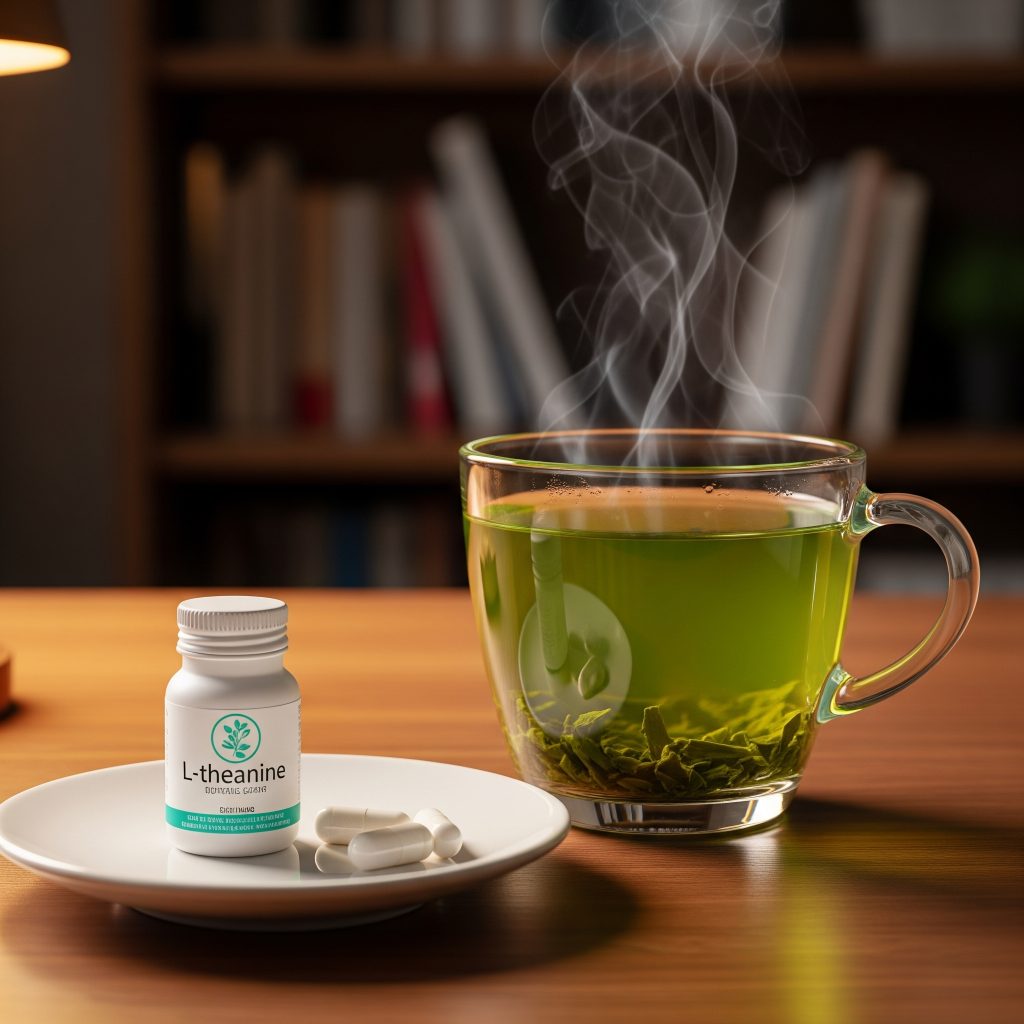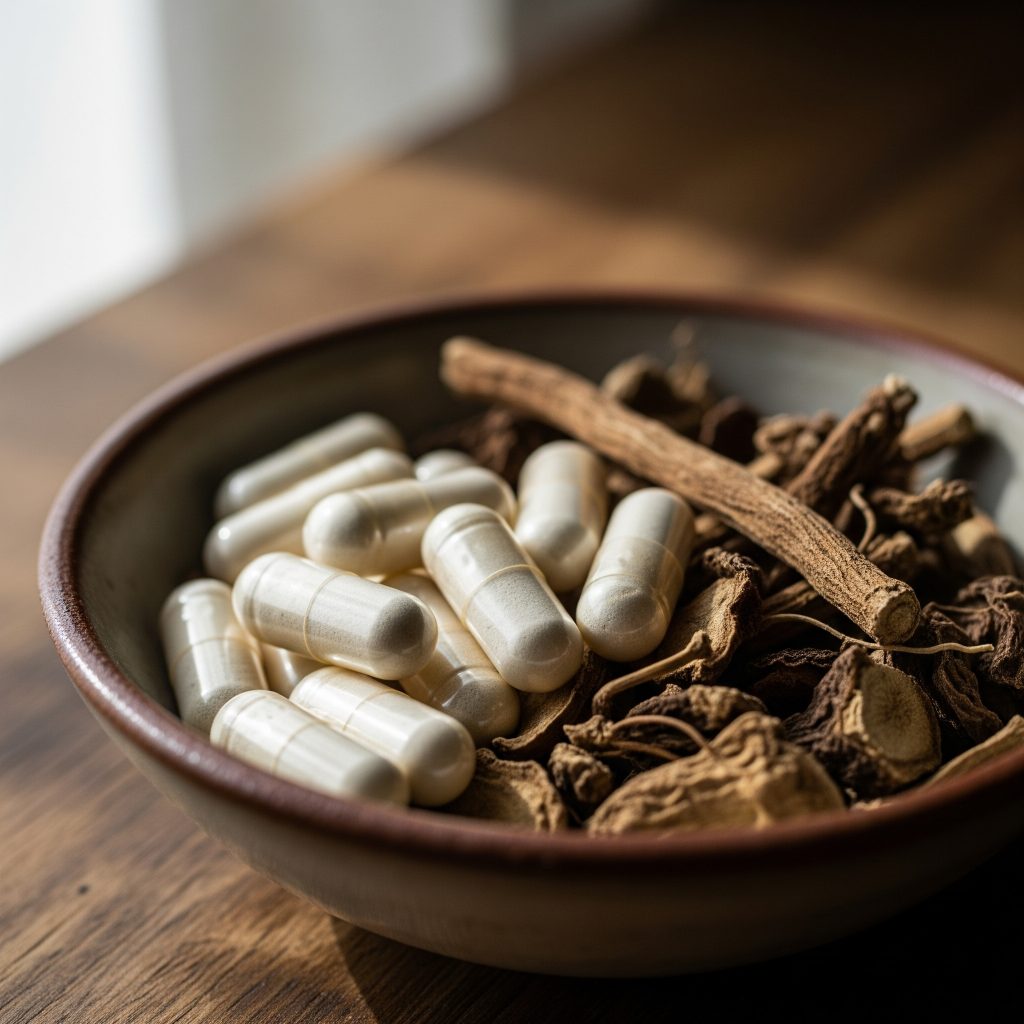If you’re looking for supplements for sleep that actually work, science shows that combining magnesium, L-theanine, and correctly timed melatonin can significantly improve sleep quality. This guide explains the most effective natural sleep aids, how to build an insomnia supplement stack, and the right timing and dosage for lasting results.
Summary / Quick Answer
The most effective supplements for sleep use a structured stack approach with proven dosing and timing:
- Foundation: Magnesium glycinate (200-400 mg) 30–60 minutes before bed
- Relaxation boost: L-theanine (100-400 mg) in the evening
- Circadian alignment: Melatonin (4 mg) 3 hours before bedtime
- Optional rotation: Low-dose GABA (75 mg) or valerian root (200 mg) 2–3 nights a week
- Protocol: Start with magnesium, add other elements gradually over 12 weeks
This method improves sleep onset, duration, and depth while reducing tolerance and side effects.
How Sleep Supplements Work in the Body
Before choosing natural sleep aids, it’s important to understand how they interact with the body’s sleep system. Quality sleep depends on two main processes:
- The circadian rhythm – your body’s 24-hour clock controlling hormone release, including melatonin.
- The sleep pressure system – influenced by brain chemicals like GABA and adenosine.
Targeted supplements act on these systems by:
- Supporting GABAergic activity (calm, relaxed brain state)
- Regulating melatonin production and timing
- Reducing stress hormone levels
- Promoting muscle relaxation for uninterrupted rest
Magnesium and L-theanine are especially effective because they target both neural relaxation and hormone regulation. For more on circadian support, see Circadian Rhythm Optimization.
Core Evidence-Based Sleep Supplements

Magnesium – The Foundation Mineral
Magnesium acts as an NMDA receptor antagonist and GABA receptor agonist, creating a calming effect. It also supports natural melatonin production. Clinical trials show magnesium glycinate or bisglycinate (200–400 mg) can shorten time to fall asleep and improve sleep continuity. See Best Magnesium for Sleep for forms with high absorption.
Key points:
- Best taken 30–60 minutes before bed
- Helps with muscle relaxation and nocturnal cramps
- Low risk of dependency
- Avoid high doses if you experience digestive upset
| Form | Dose Range | Notable Benefit |
|---|---|---|
| Glycinate | 200–400 mg | Gentle on stomach |
| Bisglycinate | 200–400 mg | High absorption |
| Citrate | 200–300 mg | May loosen stools |
L-Theanine – Calm Without Sedation
L-theanine, an amino acid from tea, increases alpha brain waves linked to relaxation and modulates GABA, dopamine, and serotonin. At 100–400 mg, it reduces sleep latency without causing next-day grogginess. Learn more in L-Theanine for Sleep.
Benefits:
- Promotes calm alertness before sleep
- Reduces stress hormone levels
- Works well in combination with magnesium
Melatonin – Timing Is Everything
Research suggests melatonin is most effective when taken 3 hours before bed, not 30 minutes prior. A 4 mg dose aligns with your body’s natural hormone peak, improving both sleep onset and duration. See Melatonin Dosage Guide for detailed instructions.
Advantages of earlier dosing:
- Better circadian rhythm alignment
- Less morning grogginess
- More consistent sleep patterns
GABA and Valerian Root – Targeted Additions
GABA (75 mg, 2–3 nights per week) helps reduce mental overactivity at bedtime, while valerian root (200 mg standardized to 2% valerenic acid) works through multiple GABA pathways. Alternating these prevents tolerance and maintains effectiveness.
Note: Avoid daily GABA use to prevent reduced responsiveness. See Sleep Supplements and Medications if you take sedatives or other CNS depressants.
Building an Effective Insomnia Supplement Stack

The most reliable results come from stacking supplements in a progressive timeline:
| Week | Additions | Purpose |
|---|---|---|
| 1–2 | Magnesium | Foundation relaxation |
| 3–4 | Melatonin (gradual increase) + L-theanine | Circadian alignment & calm |
| 5–6 | Adjust doses as needed | Personal optimization |
| 7–8 | Introduce GABA/valerian (cycling) | Deeper relaxation |
| 9–12 | Maintain cycling protocol | Long-term effectiveness |
This gradual method allows you to track responses and avoid unnecessary supplements.
Cycling and Long-Term Use Strategies
Continuous use of certain sleep aids can reduce their impact. Cycling prevents this:
3-day rotation example:
- Day 1: Magnesium + L-theanine + Melatonin
- Day 2: Magnesium + L-theanine + GABA
- Day 3: Magnesium + L-theanine + Valerian
After 3 months, take a short break from melatonin to reset sensitivity.
Safety Considerations
Even natural sleep aids can interact with medications or cause mild side effects.
- Morning grogginess – Often from late melatonin dosing
- Digestive upset – Possible with high magnesium doses
- Medication interactions – Melatonin and valerian may affect blood thinners or sedatives
Check Sleep Supplements and Medications before starting any stack.
Lifestyle Factors That Improve Results

Supplements work best alongside good sleep hygiene:
- Keep a consistent bedtime and wake time
- Limit caffeine after midday
- Use dim lighting in the evening
- Avoid large meals within 2 hours of bed
- Create a cool, quiet, and dark sleep environment
When to Seek Medical Help
If your insomnia lasts more than 3 weeks, or you have symptoms like loud snoring, gasping at night, or severe daytime fatigue, consult a healthcare professional. Sleep supplements can support but not replace medical evaluation when needed.
Conclusion
A well-planned insomnia supplement stack combining magnesium, L-theanine, and correctly timed melatonin can improve sleep onset, depth, and duration. Adding GABA or valerian on a rotating schedule maintains long-term effectiveness. By following a structured timeline and supporting your body’s natural rhythms, you can achieve consistent, restorative sleep without dependency.
For deeper reading, explore Best Magnesium for Sleep and Circadian Rhythm Optimization to fine-tune your approach.


